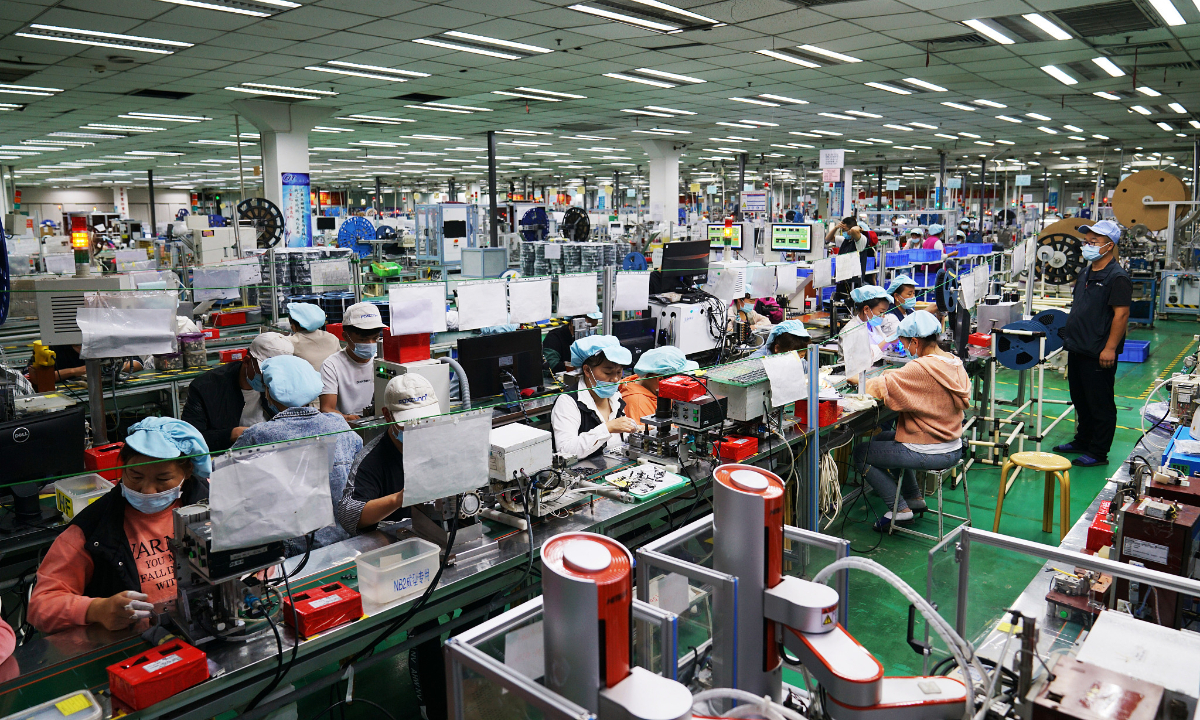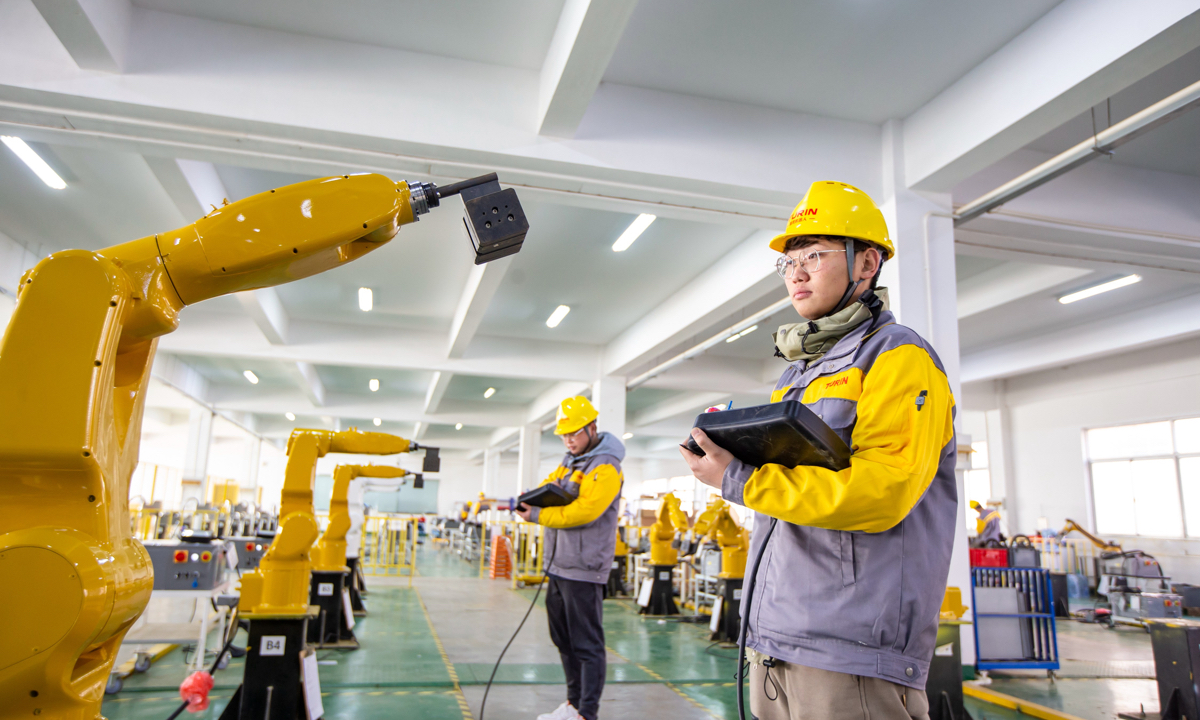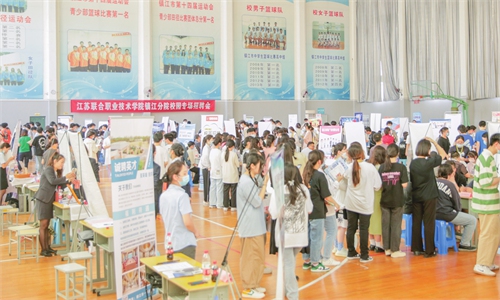Chinese factories, local govt roll out measures to avoid Spring Festival labor shortage
Labor shortage may appear amid relaxed cross-provincial travel

Workers at a production workshop of Foxconn's technology park in Zhengzhou, Central China's Henan Province on September 4, 2021. The park is a major global smartphone manufacturing base. Photo: VCG
Factories in China's major economic hubs of the Yangtze River Delta and Pearl River Delta regions have begun to survey their employees' intention of leaving for their hometowns during the Chinese Lunar New Year holidays (January 21-27), with some considering bolstering reward schemes to encourage workers to remain at their posts or come back on time, ensuring that production won't take a hit in the upcoming weeks, as the country's optimized anti-COVID-19 measures are expected to boost inter-provincial travel.Prior to the pandemic, China would experience a sudden labor shortage across the country during each Chinese Lunar New Year, as there is a tradition for Chinese to return to their hometowns for family reunion. As a result, the manufacturing industry often took a hit due to insufficient staff available. Due to the pandemic as well as the surge of overseas orders, many export-oriented factories have tried to encourage workers to stay at their posts. However the recent loosening of travel restrictions is anticipated to spark a large movement of people during this year's festival season.
The situation in Yangtze River Delta and Pearl River Delta regions, two manufacturing powerhouses in the country, is attracting more attention, prompting local governments to take measures in advance.
On December 7, Shaoxing in East China's Zhejiang Province unveiled a range of measures to encourage non-local employees to keep working during the upcoming Spring Festival, as part of the local government's efforts to stabilize the production capacity of local companies at the beginning of 2023.
Non-local employees who stay put during the Spring Festival, for example, can be granted 800 yuan ($114) in cash, as well as discounted admission tickets to local scenic spots.
Authorities have also promised to cover 70 percent of fees incurred by transporting non-local employees back to work using chartered buses. Companies who hire people to come work in Shaoxing for the first time and have paid the social security insurance for more than three months will be granted at least 250 yuan per person.
Factories take action
"Many workers are taking a wait and see approach when it comes to leaving for their hometowns for the upcoming Chinese Lunar New Year holidays due to surge in infections after the authorities relaxed COVID-19 response. It's expected that the peak for workers returning to hometowns will arrive around the January 1," a human resources director surnamed Fu with a Shenzhen-based home appliance manufacturing company in South China's Guangdong Province told the Global Times on Monday.
Fu said that the company would ask workers in advance about their willingness to return to their jobs and grant bonuses and transport subsidies for those who promise to come back or who come back earlier.
"Labor costs may rise further in the first few months of 2023, as the Chinese economy is expected to return to the pre-pandemic level very soon and domestic demand will be released accordingly," Fu said, noting that the company may have to increase salary by about 30 percent to recruit workers after the Spring Festival.
"Despite the current wave of cases across the country, no panic has been noticed within our factory and most of our workers are working as normal at their positions," Lu Huazhen, a manager of Zhejiang-based legging maker Zhuji Aishanglin Knitting Co, told the Global Times on Monday.
Amid surge in demand from Europe, the company saw significant increase in overseas orders this year, Lu said, noting that export orders for 2023 have reached about 3 million pairs. She said that the company will make appropriate arrangements for the Spring Festival holidays to ensure output.
"Many blue-collar employees prefer to stay at a workplace for a long time due to uncertainties brought about by the protracted pandemic, and for those who want to go back home, we also offer rewards to encourage them to return to their positions earlier," she said.
Lu said that 90 percent of her staff are senior workers who have been working within her company for several years, and they usually returned to their positions around the Lantern Festival, about one week after the Spring Festival holidays.
Market forces at play
"Temporary tight labor is inevitable amid the major holiday, but another problem worth equal attention is declining orders in some companies due to weak overseas demand and COVID-19 flare-ups domestically," Li Changan, a professor at the Academy of China Open Economy Studies of the International Business and Economics, told the Global Times on Monday.
Hiring is fundamentally a market practice, and if there are more orders and higher salaries, workers are undoubtedly willing to return to their positions, Li said, noting that governments should let the market force play a larger role and continue to cut tax and fees to stimulate market vitality.
A meeting of the Political Bureau of the Communist Party of China Central Committee held on December 6 stressed the country will pay special attention to ensure steady growth, employment, and strive to achieve an overall improvement in the economic performance characterized by higher quality and reasonable growth.

Workers test and adjust machineries at a plant in Hai'an, East China's Jiangsu Province on December 12, 2022. Photo: cnsphoto


